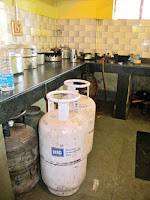Commercial Liquefied Petroleum Gas: Distribution of the 19kg commercial liquefied petroleum gas (LPG) began in the border town of Phuentsholing yesterday, almost three weeks after Thimphu.
Located near the customs third country import yard, Bhutan industrial gas (BIG) formally launched the commercial LPG yesterday in the border town, where consumers took about 18 cylinders.
Each cylinder costs Nu 1,914, which is Nu 91 less than the cost in Thimphu, excluding the security deposit of Nu 2,000 a cylinder. The 14kg subsidised domestic LPG in Phuentsholing costs Nu 450 a refill.
All hotels, restaurants and canteens have a transition period of nine days, or until November 25, to switch from the existing subsidised domestic cooking gas to commercial gas, regional trade officials said.
“Just like Thimphu, if they fail to make the switch within the stipulated period, they’ll be penalised Nu 10,000 on first instance,” the regional trade director, Kinley Wangchuk, said.
Consumption of commercial cylinders in Phuentsholing, which has more than 200 hotels, canteens and restaurants, is estimated at about 1,200 cylinders. Steel and Ferro silicon industries at Pasakha will also use the commercial gas for wielding purposes. However, it is not known how many cylinders the industrial estate consumes.
With an existing stock of about 2,000 cylinders in Phuentsholing, BIG plans to provide door-to-door delivery to hoteliers, once the sale gains momentum.
Most hoteliers in town weren’t aware of the commercial gas being available from yesterday, while smaller establishments didn’t even know they had to use commercial cylinders henceforth.
Just like in Thimphu, hoteliers complain of its pricing, saying it was three times more than what they paid for subsidised domestic cylinders, for a minimal difference in quantity.
“I’ll have no choice, but pass it down to my consumers,” Jigme, who has four domestic cylinders for his one-room restaurant, said.
Another hotelier in town, who uses about 10 cylinders, had bought two commercial gas cylinders yesterday. “I won’t be able to surrender all the existing cylinders I own,” he said. “I need it for emergencies.”
Hoteliers, Kuensel spoke with, said they will at least keep some domestic cylinders, which they would use discreetly, owing to the huge price difference.
BIG’s Singhey Gyamtsho said, if compared with the price of domestic cylinders, commercial gas will be higher. “Instead, hoteliers should compare with the price in India,” he said, explaining that a commercial cylinder in Raninagar near Siliguri in West Bengal, just outside the plant, costs Nu 1,450.
The dealer lifts the commercial gas from Raninagar, about 130km from Phuentsholing. “If hoteliers keep comparing the price with that of domestic cylinders, I don’t think the pricing can ever be justified,” Singhey Gyamtsho said.
In the Indian border town of Jaigaon, a commercial gas cylinder costs Nu 1,781. Indian regulations on use of commercial gas cylinders mandates all business establishments to use commercial gas. Those found violating the rule are liable to a non-compoundable offense of three months in jail.
While there is a shortage of commercial cylinders in Jaigaon, hoteliers or eateries make use of the domestic cylinders meant for Bhutan, which get deflected to Jaigaon.
As of now, BIG has approval to lift 50MT of commercial gas every month, which works out to 2,631 cylinders. A request has been made to the Indian government for an additional 500MT a month of commercial gas.
Once BIG gets granted the additional quota, they will start distribution in other dzongkhags, Singhey Gyamtsho said.
Commercialisation of gas is expected to ease the shortage of domestic LPG, which has affected almost all households in the country since last year.
On the safety issues, raised by some hoteliers, the dealer said people should make use of good quality standardised products. BIG has also stocked regulators and pipes to be sold to hoteliers, should they require it. “We have also trained people to cater to such safety issues from hoteliers,” Singhey Gyamtsho said.
By Kinga Dema, Phuentsholing

No comments:
Post a Comment